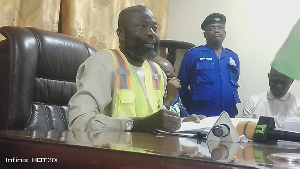A GNA feature by Albert Oppong-Ansah
Residents of Tamale and its environs were full of joy when the clouds gathered one afternoon and they thought it was a relief from the long spell of drought.
However their joyous expectation turned out to be a day of destruction and sorrow. In short the storm that came changed joy to tears.
The storm was so severe that a number of trees and electricity poles were uprooted while the roofs of many houses were ripped off.
This erratic weather pattern is almost an annual ritual facing the people of the north, which leaves sad memories in the minds of many while frantic efforts were always put in place to give relief to displaced persons.
A seven- month old pregnant woman, Safiatu Alhassan, a resident of Kalpohin village in Tamale, was one of the many people who were affected by the rain storm. Her roof was ripped off and was therefore displaced. Two people died in the disaster.
“I rushed to the room when it started drizzling. Minutes later the windy noise of the storm was obvious and after that my roof was ripped off. In fact a wood nearly hit my head,” she said.
In March this year, a number of communities from 16 districts in the Northern Region including Savelugu, Mion, Daboya, Saboba, Bunkpurugu/Yunyoo, Sagnerigu and Zabzugu were affected by the storm.
National Disaster Management Organisation pegged the number of displaced persons at 12,000 with five reported deaths while more than 2,000 structures including some schools such as Karaga Senior High School and government offices were destroyed by the ravaging storm.
The International Federation of the Red Cross through its local office in Ghana distributed 500 relief kits containing sanitary pads, hand towels, combs, razor disposables, toothpaste and mosquito nets to 500 families who were affected in Walewale, Bimbilla, Gushegu and Yendi.
The norm is that, these disasters receive much publicity by local, national and international media to attract attention.
Government and non-governmental organisations respond swiftly with aid but often fail to develop an effective means of reducing the impact of some of these natural tragedies.
In the bid to find out the antidote to the problem Reverend Father Thaddeus Kussah, a Parish Priest at the Sacred Heart Parish of the Catholic Church at Kalpohin Village, told Ghana News Agency (GNA) explained that God created trees for human beings to eat its fruits and use the leaves and barks to heal sicknesses.
Mr Tejan Jallolo, a Relief Delegate of the (IFRC) said one of the importance of trees is to serve as wind breaks from some natural occurrences such as rain storms and winds.
He explained that preliminary assessment has revealed that the Northern, Upper East and Upper West Regions are vulnerable to such natural occurrences due to their geographical location and some of the traditional settling patterns.
“Although the people have effective coping mechanism after disaster, it is important that they are educated continuously on the need to use good building materials, which will make their housing structure robust,” he said.
Mr Jallolo recommended an intensive growing of tress and fruits as medium term measure to reduce such natural phenomena.
“We need to put our house in order, be up and doing as Africans’ and stop relying on foreign aid when there is a slight problem. This is because it looks as if there is donor fatigue,” he said.
He said as part of the new strategic plan by the IFRC to deal with disasters, volunteers had been mandated to assist communities to inculcate best environmental management practices to reduce the impact of such tragedies.
Mr Anthony Baissana Regional Consultant of the Architectural and Engineering Services also bemoaned the quality of houses being constructed in the Region.
Mr Ebenezer Djaney Djagletey, Regional Manager of Forestry Commission told GNA that the 8000 hectares of forest stock are being depleted with impunity at a fast rate.
He noted that trees serve as habitat for game or fauna, provide ecological protection for the head waters of streams and control soil erosion in the fragile ecological system.
“We may continue to feel the devastating impact of rain storms if we do not stop the attitude of cutting trees for charcoal and look for other alternatives or replace tress we cut.
“This is because in the event of rain storms trees serve as wind breaks and if there is no single tree around a house then expect disaster,” he said.
He suggested the need for government to pass a law that binds people to inculcate eco friendly techniques in development planning as a long time measure to save lives and property.
The annual disaster, which makes the country to always beg for assistance could be a blessing through growing of tress to accumulate more carbon dioxide from the atmosphere and trade it with other countries.
Carbon trading according to climate expert is one of the emerging big businesses in the world. What prevents Ghana as a country especially those in the north to embark on afforestation during the wet season to gain from the ‘white gold’.
Natural disasters such as floods and rain storms cannot be stopped because they are natural phenomena however; the impact can be reduced if Ghanaians especially those at disaster prone areas make conscious efforts to grow trees on their compounds.
Indeed, it is true that misfortunes can be transformed into fortunes; after all it is a matter of attitudinal change.
ansahalbert@gmail.com
GNA
Opinions of Thursday, 25 July 2013
Columnist: Oppong-Ansah, Albert














